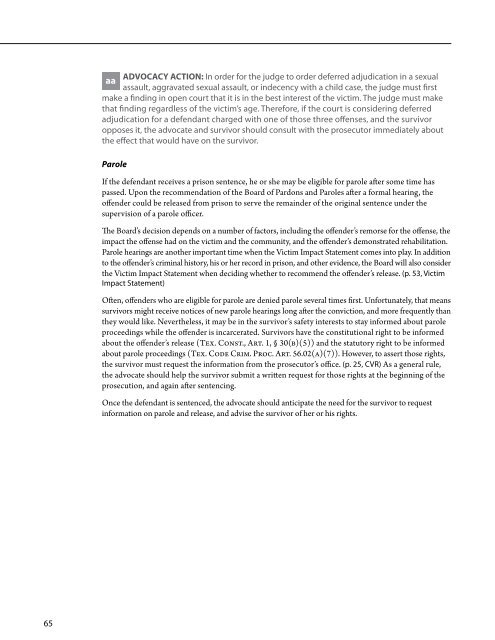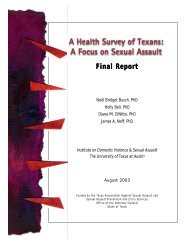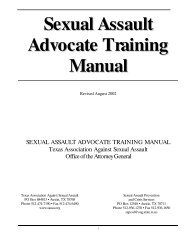Sexual aSSault LEGAL ADVOCACY MANUAL - Texas Association ...
Sexual aSSault LEGAL ADVOCACY MANUAL - Texas Association ...
Sexual aSSault LEGAL ADVOCACY MANUAL - Texas Association ...
Create successful ePaper yourself
Turn your PDF publications into a flip-book with our unique Google optimized e-Paper software.
<strong>ADVOCACY</strong> ACTION: In order for the judge to order deferred adjudication in a sexual<br />
assault, aggravated sexual assault, or indecency with a child case, the judge must first<br />
make a finding in open court that it is in the best interest of the victim. The judge must make<br />
that finding regardless of the victim’s age. Therefore, if the court is considering deferred<br />
adjudication for a defendant charged with one of those three offenses, and the survivor<br />
opposes it, the advocate and survivor should consult with the prosecutor immediately about<br />
the effect that would have on the survivor.<br />
Parole<br />
If the defendant receives a prison sentence, he or she may be eligible for parole after some time has<br />
passed. Upon the recommendation of the Board of Pardons and Paroles after a formal hearing, the<br />
offender could be released from prison to serve the remainder of the original sentence under the<br />
supervision of a parole officer.<br />
The Board’s decision depends on a number of factors, including the offender’s remorse for the offense, the<br />
impact the offense had on the victim and the community, and the offender’s demonstrated rehabilitation.<br />
Parole hearings are another important time when the Victim Impact Statement comes into play. In addition<br />
to the offender’s criminal history, his or her record in prison, and other evidence, the Board will also consider<br />
the Victim Impact Statement when deciding whether to recommend the offender’s release. (p. 53, Victim<br />
Impact Statement)<br />
Often, offenders who are eligible for parole are denied parole several times first. Unfortunately, that means<br />
survivors might receive notices of new parole hearings long after the conviction, and more frequently than<br />
they would like. Nevertheless, it may be in the survivor’s safety interests to stay informed about parole<br />
proceedings while the offender is incarcerated. Survivors have the constitutional right to be informed<br />
about the offender’s release (Tex. Const., Art. 1, § 30(b)(5)) and the statutory right to be informed<br />
about parole proceedings (Tex. Code Crim. Proc. Art. 56.02(a)(7)). However, to assert those rights,<br />
the survivor must request the information from the prosecutor’s office. (p. 25, CVR) As a general rule,<br />
the advocate should help the survivor submit a written request for those rights at the beginning of the<br />
prosecution, and again after sentencing.<br />
Once the defendant is sentenced, the advocate should anticipate the need for the survivor to request<br />
information on parole and release, and advise the survivor of her or his rights.<br />
65
















